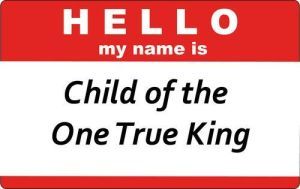Tez Brooks's Blog: TezBrooks.com, page 12
April 19, 2020
The Redemptive Story Behind the Name “Tez”
Over the years, people have asked me what “Tez” means. My response can be anywhere from “It’s a nickname” to a more in-depth explanation if I’m feeling especially transparent and they have the time.
I was born Terry Dean Brooks—not Terence, just Terry. After four male children, Mom and Dad wanted a girl so badly they decided to call the next child Terry, regardless the gender. I’m fairly certain one should never tell this to their young boy, but Mom didn’t mean any harm. Had she known how it would affect me, she would never had said it. Nevertheless, it was the beginning of some interesting issues I had to deal with.
Unathletic and bit husky, I was drawn to creativity and the arts and was a bit of a momma’s boy. During my elementary years, I was often bullied and called cruel terms like “Terry the fairy.” I wasn’t sure what it meant, but I knew it was feminine and, since I was a boy, it had to be bad.

I often found refuge on the weekends when I attended church with my guy friends who accepted me and made me feel safe. Eventually, even church was not safe. A man there, noticed my sensitive demeanor and took advantage of my need for male attention. This pedophile started grooming me at age seven (as well as several of my church friends) with kindness, gentle touches, gifts and finally, boundary testing. He eventually molested me as a young teen. None of us kids told each other—we were too ashamed. I blamed myself and buried the memory deep into my subconscious, until all I recalled was a vague memory of something terrible I must have caused.
Puberty found me confused and wondering why my normal admiration of men had suddenly turned sexual. A lot of wires get crossed in a young boy’s brain when he’s been molested and then hormones flood his body. I struggled for decades, wondering why I was attracted to both women and men—silently walking out my salvation feeling guilty and as if God regretted I was his child.
Thankfully, God kept a short-leash on me and I never strayed far from his side. I married and had children. As missionaries, my family and I were assigned to Australia for a few years. That was where God did something miraculous for my personal healing.
A few months into our assignment, I re-connected online with one of my childhood friends from church. He opened up about his abuse by the same man. I was both numb and enraged.
The conversation turned dark as we shared details and how it affected our lives growing up. As I hung up, a light turned on in my head. I suddenly realized it wasn’t my fault. I shared what I’d discovered with my wife, that I hadn’t somehow tempted this guy to do it—he forced me.
As we talked, my wife said self-blame was typical for victims who can’t deal with the loss of control over the situation. After reasoning together for a while, we prayed, my head buried in her shoulder, weeping, healing.
We decided I should get some Christian counseling so I could work through these memories and gain a healthier understanding of how it affected my relationship with men, women, my parents, my brothers, and God. The months of counsel and homework were hard but good for my healing and maturity. I understood how Christ’s work on the cross had removed the disgrace I’d carried for decades. He took my shame upon himself, exchanging it by imputing his own honor and dignity into me.

During one of my prayer times with the Lord, I distinctly recall a sense that God was giving me a new identity, and with that, a new name. Of course, I assumed that meant some biblical name that meant something profound—like with Abram (Abraham) or Saul (Paul). And I assumed it would be private, between me and God,
Nope.
Australians love to assign nicknames. One playful method is to take a name ending in “ry” and change it to “ez.” Mary becomes Mez and Jerry is changed to Jez.
They called me Tez.
It made me smile. It wasn’t the nickname itself. Though the name didn’t have all the baggage of my birth name. There was more—something restorative about how they pronounced this new label.
When I entered a room, their deep, masculine bravados would call it out as if to announce to the world that their long-lost favorite television personality had walked on stage.
“Tez!” they would shout. Sometimes in unison, sometimes consecutively, as I passed by each of their offices. I felt loved. I felt treasured.
Meanwhile, more of my writing was being published. Magazine editors asked if I would use a pen name, since Terry Brooks was a famous fantasy fiction author. It wasn’t prudent for me to use the same name, so I agreed to the pseudonym “Tez Brooks.”
Before long, my wife started calling me Tez, and it stuck. I felt too old for a name change, but by the time we returned to the United States, it’s who I was. Only then did it occur to me God had indeed given me a gift in this new title. He’d transformed my heart, healing me from deep wounds. I arrived home a new man.
Very few people now know my given name. Except for my medical records, most everything (my mail, my bank, even my signature) changed to Tez. The old name, carrying memories of hurt and shame, has passed away.
“I don’t mean to say I am perfect, I haven’t learned all I should even yet, but I keep working toward that day when I will finally be all that Christ saved me for and wants me to be” (Philippians 3:12, TLB).
Some of my relatives can’t find it in themselves to call me Tez. That’s okay, old habits are hard to break, so I give them grace. Although they know about my past, perhaps they don’t understand the liberating nature of this name change. I’m grateful to those who do refer to me as Tez after calling me Terry for decades. Because each time they say Tez, it reminds me of God’s grace. It builds me up, making those people who’ve adopted this new label part of my redemption.
I understand how Simon might have felt when Jesus said, “I’m going to tell you who you really are. You are Peter, a rock.” (Matthew 16:18, MSG). More than a simple nickname—it’s my new identity in Christ.

April 4, 2020
Taking a Licking
Be alert and of sober mind. Your enemy the devil prowls around like a roaring lion, looking for someone to devour. 1 Peter 5:8
While walking through a wildlife rescue camp where I volunteered, the owner introduced me to Sheba, a Florida cougar who’d been there for years, unable to hunt on her own because of injuries.
As she basked in the sunlight of her cage, her eyes closed in lazy delight. She looked so tame.
“Would you like to touch her?” the owner said.
“Really?” I smiled, astonished.
“If you keep your hand opened flat against the bars, she’ll lick you. Just don’t let her do it too long.”
“Why is that?” I asked.
“Sheba’s tongue is like sandpaper. After three to four licks, she’ll draw blood. Once she tastes that—.
“She’s a wild animal” I smiled. “I get it.”
I stretched forth my hand. Sure enough, after the third lick my hand had what looked like road rash. I decided that was the closest I wanted to get to a panther. It took several days for my hand to heal.
How often do we try to get as near as we can to the enemy without succumbing to his bite? Rather than running from temptation, we walk as close to the bars as we can, testing our willpower and God’s protection. When will we learn to stop playing with fire? Thankfully, he will not allow us to be tempted beyond what we can bear (1 Corinthians 10:13).
March 30, 2020
Modesty and Your Teen Daughter
“What have you got on? Nope! Go up ad change right now young lady.”
Have you had to have the modesty talk yet? Did she understand, or look at you like you have two heads? For decades, society has been flooding our kids with images of what is acceptable and cool, sexualizing our daughters and confusing them about what is considered normal.
This TED Talk is a wonderful introduction to having the conversation with your girls. Perhaps you have some ideas of your own. Your advice is gold to those parents who might be clueless on where to start. If you’re on the back end of this season of life, now is your chance to help out others who are about to enter this phase with their kids. Share your wisdom in the comments.
February 6, 2020
10 Things to Know About Tipping
Benjamin Franklin once said, “To overtip is to appear an ass, to undertip is to appear an even greater [one].” So what’s to be done?

Tipping has become one of the most widespread practices in America. Everyone knows how to express delight at excellent service, whether it’s an Uber driver, cruise ship personnel, or hotel concierge. But it can get complex. Before you go diving into your pockets for tips, there are 10 things you need to know before tipping. Understanding these simple facts will help you tip fairly and make the system work as it should.
THE “ITCHING PALM” TREND
I walked into the pizza place to pick up my pie and breadsticks. I call it a “place” because it was not a restaurant. It was a counter with one chair in case you needed to wait for your order to be boxed up. Pizza delivery boys came and went through the front door as I waited.
It was then I noticed the jar next to the cash register. It read “Tips for Our Drivers.” Like a confused puppy, my head tilted as I tried to understand what they were doing. Apparently, the business wanted me to help their drivers make more money when they should actually be getting tips upon arrival at each house.
I found this strange since tips are based on performance and I had no idea if these drivers were prompt, polite, and delivering hot pizzas, intact. What if they were slackers and didn’t deserve a tip? Or let’s assume they were doing a great job and all the customers were already tipping sufficiently–was I too, supposed to add to the jar here in the storefront? Nay!
Don’t get me wrong, I enjoy tipping. But at one recent coffee shop, I got a dirty look from the cashier for ignoring the tip prompt on the screen. I wasn’t served anything. I wasn’t at a table. My drink was “To Go.”
I did all the work of getting out of my car, walking up to the counter, telling her what I wanted, paying for it, then standing and waiting at the end of the counter. For whom was that tip?

Tipping is getting out of hand and you won’t know you are being “taken” unless you educate yourself.
Someone, somewhere, decided it was a good idea to guilt customers into tipping and the idea spread quickly. It began with tip jars and has now moved into digital coercion. Every time I encounter the dreaded tablet or kiosk that asks for a tip, I immediately become aware of who is watching me as I tap on “No Tip.”
Many of my Christain friends tip everyone and they tip excessively, thinking it’s some kind of gospel message for the servers. This sounds harsh but filling the waiter’s wallet isn’t going to convert him–if he’s not born again he’s still going to hell and he can’t even take the cash with him.
Others have used the scripture from Romans 4:4, “Now to the one who works, wages are not credited as a gift but as an obligation.” However, this refers to wages, not tips/rewards. The gift of a tip is exactly that–a gift. It is not an obligation. The business owner is the one responsible for paying decent wages to the server. He and his employee have agreed to take a chance on seeing if excellent service can help pay the wages and most times it does. But it is not our job to make up for poor wages. Remember, the employee had a choice and knew about the low wages before he/she accepted the job. They are free to leave at any time, and seek a more lucrative job.
Little or no tips helps the waiter/waitress or other service-related employee know when they are not measuring up to standards. Sadly, those standards differ from customer to customer. I used to wait tables, I know how hard it is to please every person at each table. But I knew what I was getting myself into and worked all the harder.
While it’s true, waiters live off their tips, tipping lately has become more mandatory than voluntary. It rarely relates to the quality of the service, and can tragically be based more on ethnicity or gender. But here’s the thing, tipping is supposed to be based on a system of rewarding those for outstanding service.

When we tip out of obligation or pity, we, in essence, are tearing down the system and its purpose. What we do in rewarding everyone is that we encourage laziness and entitlement. Everyone gets rewarded, so no one tries to improve their service. We end up encouraging employees to provide terrible service instead of working in another field more suited for them.
THE HISTORY
The custom originated in Europe, and while its history is not entirely clear, it is commonly traced back to 17th century England. The word “tip” is an acronym for “To Insure Promptitude,” which was printed on tip bowls in British coffeehouses.
After the Civil War, tipping made its way to the USA, when wealthy Americans started traveling to and from Europe. They brought the custom back home to show off their worldliness, but it was disdainfully considered an affront to democracy.
I have lived overseas, in a country that doesn’t practice tipping. I saw the pros and cons. It was nice to not worry about a tip, but the food was more expensive. Why? Because employers had to pay higher wages, so that expense was absorbed by me. I didn’t like that the staff often disappeared for long periods of time. After all, nothing drove them to keep coming back and checking on me–they got the same pay regardless of service. We often experienced 2-3 different waiters, too. Our table wasn’t assigned to one particular waiter because the job wasn’t tip-based. The nice thing, however, was I could recruit help from any server. No need to ask around for our personal waiter if I needed a refill.

WHAT YOU NEED TO KNOW
Service providers know more about tipping than you do. As a former waiter, I realized the following facts and operated perfectly fine within that understanding. These days, I tend to tip about 17% for normal service. Not because I feel manipulated, but because I appreciate being waited on and taken care of. I’ll tip 20% or more for excellent service.
You should report any staff that confronts you about a tip. This is unprofessional and smacks of entitlement. Tips are a gift and should be treated as such. So, here are 10 things you need to teach your kids (and maybe yourself) about tipping:
Tips are optional. Customers are never required to give, even for good service.Understand the reason for tips = to encourage competition among co-workers. It has nothing to do with your generosity or Christianity. Know that weeding out bad service is all part of what makes America a democracy.Never give out of guilt or pity. Give to help teach service providers how to perform.If you haven’t been waited on above the norm, reconsider your tip amount. If you have done some of their job, reduce the tip accordingly. (EX: using a kiosk on the table to order more food or to pay your bill).Consider tipping more if service remained great in the midst of chaos, busy periods or large groups/parties.Depending on tips to survive is a choice. The employee has counted the cost and understands they will have good and bad days. It’s not your job to make up for those bad days. Not every service provider is paid poorly or needs tips. Educate yourself on typical wages for various jobs: hotel maids, shoeshine stands, curbside skycaps, cab drivers, etc.) Some you tip on percentage, others by services rendered.The cook or bartender may be at fault, but it’s ultimately the server who must take responsibility for what’s on your plate.
Tipping can be fun, especially if you are generous and have a big heart. It’s enjoyable for me to tip big. Blessing people for hard work is something we all should be doing. Stingy is not what we are called to be in this world. But we also need to be aware of businesses that try to take advantage of customers who don’t know better. It’s the customer’s job to make sure tipping under duress is discouraged. Being strong and not giving into the crowd mentality is the only way to help guilt-tipping fail. Let’s help each other and support only those who deserve rewards.
Can you imagine all restaurants adopting a no-tipping policy? How would this affect you? The businesses? The servers? America’s workforce?
December 31, 2019
Guest Blog Guidelines
Guest posts must meet the following guidelines:
We offer no payment, but you will get exposure on an award-winning website as well as Facebook, Twitter, Goodreads, Amazon, and more.Please submit your work to tezwrites@gmail.com as an attached Word document. Do not include your article in the body of the email.We are a Christian site; no profanity or explicit wording tolerated.Topics promoting non-Christian values are not accepted.Content: marriage and family, parenting, blended familiesWe prefer 400-800 words.I will supply a stock image, but you can submit a high-quality, original image for consideration.Please submit a short bio (75 words or less) along with your photo (optional).I will notify you when it’s posted (usually within two weeks unless it’s a seasonal piece).I have the right to edit or decide against posting your blog entry.If extensive edits are needed, I will discuss this with you so we are in agreement.
I look forward to reading your submission. SUBMIT NOW
December 18, 2019
Are Christians Offering the Wrong Support?
 Recently at a conference, I met Shane*, a construction worker and single dad who loves Jesus and is deeply committed to following the Lord. But Shane struggles with feelings for other guys. His church offers a ministry to those like Shane.
Recently at a conference, I met Shane*, a construction worker and single dad who loves Jesus and is deeply committed to following the Lord. But Shane struggles with feelings for other guys. His church offers a ministry to those like Shane.
Although the group offered him a tight community, he found it alienating and hard to make room for other people at church he might enjoy getting to know, like parents or those in the construction business.
“I just want to be looked at as a regular guy.” Shane said. “A Christian, without labels.”
I felt sad for Shane. There’s a lot of Christian organizations and churches reaching out and ministering to believers who experience homosexual feelings. But are Christians offering the wrong support?
Along with this comes the argument about what they like to be called. Some say they want to be identified as a person who struggles with attraction to the same gender. Others call themselves gay Christians. To determine which is the proper terminology, we must first explore both of these titles a little closer. Only then can we help guys like Shane.
THE CONFUSING LABEL
To be honest, the term gay Christian is an oxymoron to many Christians, because the word gay carries with it a stigma. Among the evangelical community, it implies a certain lifestyle that is contrary to a Christian’s life.
 The title of gay might mean something different to the world at large, (or even to the celibate individual living a holy lifestyle and identifying themselves as a gay Christian). Still, to the majority of believers, “gay” assumes you have embraced the militant, activist movement that includes pride marches, rainbow flags, shaking fists, and holding signs that read “We’re Here, We’re Queer, Get Used to It!” To a lot of Bible-believing Christ-followers, gay means you are actively involved in a sexual relationship(s) with someone of the same gender and are not attempting to pursue a holy life of abstinence. This is how most Christians interpret gay, as a verb.
The title of gay might mean something different to the world at large, (or even to the celibate individual living a holy lifestyle and identifying themselves as a gay Christian). Still, to the majority of believers, “gay” assumes you have embraced the militant, activist movement that includes pride marches, rainbow flags, shaking fists, and holding signs that read “We’re Here, We’re Queer, Get Used to It!” To a lot of Bible-believing Christ-followers, gay means you are actively involved in a sexual relationship(s) with someone of the same gender and are not attempting to pursue a holy life of abstinence. This is how most Christians interpret gay, as a verb.
With this definition in mind, we can see how the phrase gay Christian, upsets believers because it’s like saying “I’m a lying or stealing Christian” or “I’m a Christian who deliberately disobeys God.” It just doesn’t make sense to many Christians and feels downright blasphemous for someone to claim they are a follower of Christ, yet blatantly refuse to leave a lifestyle of sin. It brings reproach upon the church, themselves, and the name of Christ.
This can be an awful accusation to the innocent Christian who is refraining from this temptation but doesn’t know what else to call him or herself. While it’s not right for believers to assume the worst, it’s hard not to with a phrase that carries such a scandalous definition.
Right about now I’m sure I’ve got some people upset at me. In particular, some of my gay male friends who claim to be Christian and believe they are following God’s commands by being in a loving, exclusive relationship (or married to) one man. Hopefully, we can agree to disagree, still love one another, and remain friends without misinterpreting truth for some kind of hatred.
But that’s a whole other topic and an entirely different demographic. This blog post is referring to believers who hold to the traditional biblical standards of purity and God’s design for men and women in spite of their unnatural sexual desires.
THE ACCEPTABLE LABEL
Another phrase, same-sex attracted (SSA), seems to please Christians. It emotes empathy. Christians understand this issue and more readily embrace it because it doesn’t imply that sin is happening….it only implies a temptation. It is likened to someone categorizing themselves opposite-sex attracted or a Christian struggling with lust.
Some have said this label too, has implied evil. The phrase sprang up out of the ex-gay movement of the 90s. Behavior adjustment camps like Exodus International taught that homosexual behavior could be fixed by re-training the mind to be attracted to the opposite sex. Many young people who just couldn’t seem to be fixed were ostracized and accused of rejecting the gospel or righteousness. They left the programs confused and many left the faith, mad at God and hating the church.
Still, this is not enough reason to reject the phrase SSA when it so accurately describes someone’s issue without implying ungodly activity. There is little baggage to this phrase that implies evil intent—only a cry for help.
THE BIBLICAL LABEL
But I would plead that both labels are incorrect for these Christians trying to live holy lives free from sin. We miss the mark when we begin to bring attention or make this particular sin special. When we form customized affinity groups for those struggling with attraction toward the same gender, we place the focus (and sympathy) on the sin, making it bigger, or greater than other sins.
Rather, we should be treating it like any other sin. After all, does God categorize sins as lesser or greater? By diminishing its importance, we correctly place the focus on mortification (i.e. pursuing holiness by intentionally and strategically attempting to kill fleshly desires) rather than identification—and that’s the more biblical solution to any sin.
I do think it’s great to acknowledge that certain issues hold more difficult challenges (i.e. money mismanagement, eating disorders, alcoholism, porn addiction, homosexuality) and necessitate special support and understanding. However, when it begins to separate and elevate struggles over others, I think we fail our dear comrades like Shane.
We must re-direct these precious brothers and sisters from identifying to mortifying, then we place the emphasis on the work of Christ and his blood instead of on their sins. Born again children of God have a new identity, we are new creatures! We need not continue to call ourselves by our old labels. This only defeats and beats us down so that we can not rise above it to be what Christ has already made us—victorious over sin and death.
MY STORY
Lest you shake a finger and say, “The identity that comes with same-sex attraction runs deep in the psyche of those who own it. You can’t possibly know what it’s like! It can’t be easily thrown off or minimized.”
You’re right. Ever since I was molested as a young teen by a man in our church, I myself have struggled with attraction toward men at times. (That’s right, I just outed myself. Ha! But it’s not the first time. I’ve outed myself to several groups over the decades).
By God’s grace, he kept a very short leash on me. I never turned from him or the church. Over the decades I realized God probably was never going to remove these feelings, but he graciously continued to give me an attraction for women. I see his redemptive power in my life every day when I look at my lovely wife, four amazing children, and a thriving ministry.
His pardon overwhelms me. I’m not worthy.
I don’t mean to say I’m perfect, I haven’t learned all I should even yet. But I keep working toward that day when I will finally be all that Christ saved me for and wants me to be (Phil 3:12 LB). I stand as a testimony of God’s grace because I know I have lots of issues. I struggle with pride, arrogance, fear of failure, anger, temptation to look at porn, to lie, to steal, to stare too long at a woman… or a man, to watch too much TV or eat too many donuts, to neglect my wife or yell at my kids, ignore the Bible, not love others like Christ…the list goes on.
But I cannot walk around writing these sins on my forehead and making sure everyone understands this is who I am. I can’t constantly identify by creating a public spotlight for each of those issues and hanging out with others of similar pigeon-holes, just because I feel they “get me” more than other Christians. I must abase my flesh and die to self. Because my propensity to sin is not who I am. I’m so much more than my battles—I’m a husband, a daddy, a missionary, an author, a hiker, a pizza-lover, and more. Primarily, I am no longer a slave to sin, but a child of God. That is my utmost identity (Romans 6:6).
LET US THROW IT OFF
Labels only reinforce the old man and make him harder to resist. How long can a person who calls himself a gay Christian continue to deny that temptation and act out on it? How long can someone say they have SSA without it becoming a self-fulfilling prophecy?
Those identifying as Christians who are gay, SSA, gender dysphoric or anything on the LGBTQ+ spectrum need loving, gentle guidance. Believers immersed and grounded in God’s word can help them live life more abundantly. Every Christ-follower (you, me, Shane…even the late Billy Graham) must learn to sever of our hearts and minds from Satan’s stamps and embrace our new identity as “cherished of God,” “highly favored,” “saint,” “lover of righteousness,” “holy one,” “child of the light.”
Ephesians 4: 22-24 reminds us, what we were taught with regard to our former way of life—to put off our old self, which is being corrupted by its deceitful desires and be made new in our minds. To put on the new nature that was created to be like God in true righteousness and holiness. Only when we strip away the old man and pursue who God has called us to be, will we experience true freedom from sin.
*name changed for privacy
December 14, 2019
November 28, 2019
10 Things to Teach Your Kids About Tipping
Benjamin Franklin once said, “To overtip is to appear an ass, to undertip is to appear an even greater ass.” So what’s to be done?

Tipping has become one of the most widespread practices in America. Everyone knows how to express delight at excellent service, whether it’s an Uber driver, cruise ship personnel, or hotel concierge. But it can get complex. Before our kids become adults, diving into their pockets for tips, there are 10 things they need to know before tipping. Understanding these simple facts will help you tip fairly and help the system work as it should.
THE “ITCHING PALM” TREND
I walked into the pizza place to pick up my pie and breadsticks. I call it a “place” because it was not a restaurant. It was a counter with one chair in case you needed to wait for your order to be boxed up. Pizza delivery boys came and went through the front door as I waited.
It was then I noticed the jar next to the cash register. It read “Tips for Our Drivers.” Like a confused puppy, my head tilted as I tried to understand what they were asking. Apparently, the business wanted me to help their drivers (who should be getting tips when they arrive at each house) make more money.
I find this strange since tips are based on performance and I have no idea if these drivers are prompt, polite, and delivering hot pizzas, intact. What if they are slackers and don’t deserve a tip? Or let’s assume they are doing a great job and all the customers are already tipping sufficiently–do I too, add to the jar here in the storefront?
Don’t get me wrong, I don’t mind tipping. But at one recent coffee shop, I got a dirty look from the cashier for ignoring the tip prompt on the screen. I wasn’t served anything. I wasn’t at a table. My drink was “To Go.”
I did all the work of getting out of my car, walking up to the counter, telling her what I wanted, paying for it , then standing and waiting at the end of the counter. Who did she expect is supposed to get that tip?

Tipping is getting out of hand. Someone, somewhere decided it was a good idea to guilt customers into tipping. It began with tip jars and has now moved into digital coercion. Every time I encounter the dreaded tablet or kiosk that asked for a tip, I immediately become aware of who is watching me as I tap on “No Tip.”
Many of my Christain friends tip everyone and they tip excessively, thinking it’s some kind of gospel message for the servers. I hate to say it, but filling the waiter’s wallet isn’t going to convert him–he’s still going to hell and he can’t even take the cash with him.
Others I discussed this topic with have used the scripture from Romans 4:4, “Now to the one who works, wages are not credited as a gift but as an obligation.” However, this refers to wages, not tips/rewards. The gift of a tip is exactly that–a gift. It is not an obligation. The business owner is the one responsible for paying decent wages to the server. It is not our job to make up for poor wages. Remember, the employee had a choice and knew about the low wages before he/she accepted the job. They are free to leave at any time, and seek a more lucrative job.
Little or no tips helps the waiter/waitress or other service-related employee know when they are not measuring up to standards. Sadly, those standards differ from customer to customer. I used to wait tables, I know how hard it is to please every person at each table. But I knew what I was getting myself into.
While it’s true, waiters live off their tips, tipping lately has become more mandatory than voluntary. It rarely relates to the quality of the service, and can tragically be based more on ethnicity or gender. But here’s the thing, tipping is supposed to be based on a system of rewarding those with good service.

When we tip out of obligation or pity, we, in essence, are tearing down the system and its purpose. What we do in rewarding everyone is that we encourage laziness and entitlement. Everyone gets rewarded so no one tried to improve their service and we encourage terrible employees that should be working in another field they are more suited for.
THE HISTORY
The custom originated in Europe, and while its history is not entirely clear, it is commonly traced back to 17th century England. The word “tip” is an acronym for “To Insure Promptitude,” which was printed on tip bowls in British coffeehouses.
After the Civil War, tipping made its way to the USA, when wealthy Americans started traveling to and from Europe. They brought the custom back home to show off their worldliness, but it was disdainfully considered an affront to democracy.
I have lived overseas, in a country that doesn’t practice tipping. I saw the pros and cons. It was nice to not worry about a tip, but the food was more expensive. Why? Because employers had to pay higher wages, thus the expense was absorbed by me. I didn’t like that the staff often disappeared for long periods of time. After all, nothing drove them to keep coming back and checking on me–they got the same pay regardless of service. We often experienced 2-3 different waiters. Our table wasn’t assigned to one particular waiter because the job wasn’t tip-based. The nice thing however was I could recruit help from any server. No need to ask around for our personal waiter if I needed a refill.

WHAT YOU NEED TO KNOW
Service providers know more about tipping than you do. As a former waiter, I realized the following facts and operated perfectly fine within that understanding. These days, I tend to tip about 18% for normal service. Not because I feel manipulated, but because I appreciate being waited on and taken care of. I’ll tip 20% or more for excellent service. I also believe you should report any staff that confronts you about a tip. This is unprofessional and smacks of entitlement-something you don’t want your kids to pick up as a habit. Tips are a gift and should be treated as such. So, here are 10 things you need to teach your kids (and maybe yourself) about tipping:
Tips are optional. Customers are never required to give, even for good service.Understand the reason for tips = to encourage competition among co-workers. It has nothing to do with your generosity or Christianity. Know that weeding out bad service is all part of what makes America a democracy.Never give out of guilt or pity. Give to help teach service providers how to perform.If you haven’t been waited on above the staff’s normal job duties, reconsider if tipping is deserved. If you have done some of their job, adjust the tip accordingly. (EX: using a kiosk on the table to order more food or to pay your bill).Consider tipping more if service remained great in the midst of chaos, busy periods or large groups/parties.Depending on tips to survive is a choice. The employee has counted the cost and understands they will have good and bad days. It’s not your job to make up for that. Not every service provider is paid poorly or needs tips. Educate yourself on typical wages for various jobs: hotel maids, shoeshine stands, curbside skycaps, cab drivers, etc.) Some you tip on percentage, others by services rendered.Understand that although the server may have had a lot of mean customers or they themselves have personal problems, your tips are not meant to make up for those issues. The server knows this too.
I’m not against tipping; it can be fun, especially if you are generous and have a big heart. It’s enjoyable for me to tip big. I don’t have to be around to see the waiter’s face. Knowing I’m rewarding them is good enough for me. Blessing people for hard work is something we all should be doing. Stingy cheapskates is not what we are called to be in this world. But we also need to be aware of businesses that try to take advantage of customers. It’s our job to make sure tipping under duress is discouraged. Being strong and not giving into the crowd mentality is the only way to help guilt-tipping fail. Let’s help our kids do their part to support only those who deserve a tip.
Can you imagine all restaurants adopting a no-tipping policy? How would this affect you? Your kids? The businesses? The servers? America’s workforce?
November 20, 2019
Recommended Single Dad Movies
Here’s just a few that portray single dads as intelligent, caring fathers. What movies do YOU suggest? List them in the comments. (Movie ratings and reviews can be found at PluggedIn.com)
The Pursuit of Happyness
A true story based on Chris Gardner’s one-year struggle with homelessness. The film features Will Smith as Gardner, an on-and-off-homeless salesman. Smith’s son Jaden Smith co-stars, making his film debut as Gardner’s son, Christopher Jr. Based on the best-selling memoir written by Gardner. Released in December 2006, by Columbia Pictures. For his performance, Smith was nominated for an Academy Award and a Golden Globe for Best Actor.
Signs
A 2002 American sci-fi horror written and directed by M. Night Shyamalan. The story focuses on a former Episcopal priest named Graham Hess, played by Mel Gibson, who discovers a series of crop circles in his cornfield. Hess slowly discovers that the phenomena is a result of extraterrestrial life. It explores family bonds, faith and the sovereignty of God.
I Am Sam
Sean Penn plays a mentally handicapped man who fights for custody of his 7-year-old daughter (Dakota Fanning) and in the process teaches his cold-hearted lawyer (Michelle Pheiffer) the value of love and family.
Finding Nemo
Finding Nemo is a 2003 computer-animated adventure film produced by Pixar and released by Walt Disney Pictures. It tells the story of the over-protective clownfish named Marlin (Albert Brooks) who, along with a regal tang named Dory (Ellen De Generes), searches for his abducted son Nemo all the way to Sydney Harbour. Along the way, Marlin learns to take risks and let Nemo take care of himself. The film received widespread critical acclaim and won the Academy Award for Best Animated Feature. Watch it with your kids.
Kramer vs. Kramer
After his wife walks out, a father fights for custody of his child when his ex-spouse returns expecting full custody. Starring Dustin Hoffman and Meryl Streep. Ted Kramer is a career man and sadly his work comes before his family. His wife Joanna cannot take it anymore and abandons the family. Ted is now faced with the tasks of housekeeping and taking care of himself and their young son Billy. After adjusting his life to these new responsibilities, Joanna resurfaces and wants Billy back.
Mrs. Doubtfire
Just how far is a father willing to go to see his kids? After a bitter divorce, a loving dad (Robin Williams) disguises himself as a female housekeeper to spend time with his children of whom his former wife has sole custody.
The Goofy Movie
It’s hard to be cool when your dad is Goofy. This animated film follows single dad Goofy and his son, Max, who is now in high school. It revolves around the father-son relationship between the two as Goofy takes Max on a fishing trip out of fear that Max is drifting away from him, unintentionally interfering with Max’s social life, particularly his relationship with a girl, on whom Max has a crush.
These are just a few. What movies do YOU suggest? List them in the comments below.




